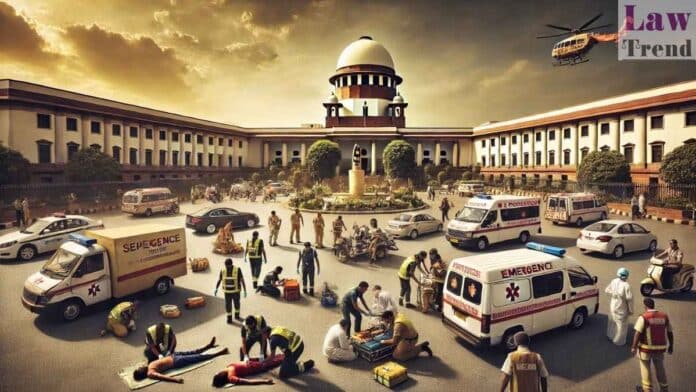In a significant ruling on motor accident compensation, the Supreme Court has held that insurance companies are not liable to pay compensation if a driver’s death results from his own negligence or reckless driving. The Court emphasized that when an accident occurs due to the driver’s own fault—such as overspeeding, performing stunts, or violating traffic rules—the insurer cannot be compelled to compensate the deceased’s family.
The judgment was delivered by a bench comprising Justice P.S. Narasimha and Justice R. Mahadevan. The Court was hearing an appeal filed by the wife, son, and parents of a man named N.S. Ravish, who died in a road accident on June 18, 2014.
Background of the Case
The incident occurred when Ravish was driving his Fiat Linea car from Mallasandra village to Arsikere town in Karnataka. His father, sister, and her children were also in the car. While driving at high speed and in a negligent manner, Ravish lost control of the vehicle near Mayalanahalli Gate, resulting in the car overturning. Ravish sustained severe injuries and died on the spot.
The family filed a claim seeking ₹80 lakh as compensation from United India Insurance Company, asserting that Ravish was a contractor earning ₹3 lakh per month. However, the police charge sheet explicitly stated that the accident was caused due to Ravish’s own rash and negligent driving.
Tribunal and High Court Decisions
The Motor Accidents Claims Tribunal rejected the family’s claim. The Karnataka High Court also dismissed their appeal on November 23, 2024, noting that compensation under a motor insurance policy is not payable when the accident occurs solely due to the insured person’s fault. The High Court underscored that the claimants must prove the accident was not due to the deceased’s negligence and that it falls within the scope of the policy coverage.
Supreme Court’s Observation
Upholding the High Court’s findings, the Supreme Court ruled that the insurance company is not obligated to pay compensation if the accident is entirely attributable to the deceased driver’s own fault, and there is no external factor involved.
The Court observed,
“If the death is solely due to the fault of the deceased driver and not caused by any external agency or third-party involvement, the insurer is not bound to pay compensation.”




